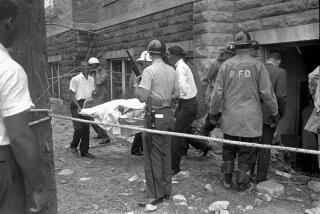Tears, Silence; Then Time to Move On in Their Lives
OKLAHOMA CITY — It was over. Church bells pealed. The moon still hung in the blue prairie sky. There were tears, prayers and long, shuddering hugs. Mostly, there was quiet.
Timothy J. McVeigh was dead.
At the memorial to his victims--built on the site of the building he blasted--mothers with babies, couples in love, survivors, mourners, tourists and police officers all stared straight ahead and let the moment tick past.
One man had a portable TV. Dozens gathered around him, leaning in to hear the warden pronounce the execution over. One woman, her face blank, listened to a radio for the word. Others did not care to listen. They stood alone, waiting as 7 a.m., 7:14, came and went.
Rick Weatherby was staring hard at an empty chair, one of the 168 sculpted pieces representing the lives McVeigh took when he bombed the Alfred P. Murrah Federal Building here April 19, 1995. This chair was for his friend, Julie Welch. She was 23 when she died. Weatherby stared at that chair for an hour, for two, eyes wet, unblinking. He ripped his gaze free only for a moment, to hear a stranger report that McVeigh was dead. “He’s gone?” Weatherby asked. Then he shook his head. Then he went back to that chair. “Doesn’t bring anybody back, does it?”
Half an hour later, he shook himself from his memories. He left the empty chair.
“Guess it’s time,” he said, “to go to work.”
And so it went Monday in Oklahoma City. In the morning, at the memorial, there was tension--a long, tough wait for the news. When it finally came, there was relief--or revulsion. McVeigh--on every channel, every station.
Then the rhythms of a normal day kicked in: The traffic jams and the country music, the hunt for a parking spot, the warm June sun. Kids on summer break from school riding their bikes. Oil wells pumping. Barbers trimming.
Customers lined up for doughnuts at Brown’s Bakery, debating whether they should get chocolate glazed or chocolate cake, while on the television in the corner a bombing victim described McVeigh’s “look of defiance” as he died. In a bagel shop at the north end of town, five friends spent five minutes agreeing that McVeigh should have been left to rot in prison, not put to a peaceful death. Then they moved onto discussing the Lakers. The banner headline of the Daily Oklahoman read “Judgment Day,” but the talk in the bagel shop was all Shaq.
Then there was the scene at Kathy Wilburn’s house.
A gleaming stretch limo pulled up to the curb at 3:10 a.m.--ready to ferry her to a closed-circuit broadcast of the execution. Wilburn lost two grandsons in the bombing. Ever since, she’s been investigating McVeigh, traveling his paths, meeting his associates, reading the thousands of pages of documents she has stashed near the Christmas gift-wrapping paper in her closet. Wilburn is convinced McVeigh did not act alone. She is producing a documentary on that very point. And she is talking, talking to every reporter who calls, trying to spread her message while the world still is listening.
Sipping a Diet Dr Pepper and devouring a cranberry muffin, Wilburn went over her schedule for execution day as her documentary crew set up cameras in the limo to film her on her way to watch McVeigh die. She had “Good Morning America” on tap for later in the day, and the “Today” show and the New York Post and the BBC and Court TV and “The O’Reilly Factor” and CNN and on and on--right through “Geraldo” at 8 p.m. “A media nightmare,” she grumbled. “But I have to strike while the iron is hot.”
She wasn’t alone. All morning, survivors and friends and family of victims shuttled from camera to camera outside the memorial, climbing scaffold podiums to makeshift TV studios set against the backdrop of 168 empty chairs. They wanted the day’s focus to be here, not there--on the living, not on the dying.
At 4 a.m., reporters outnumbered visitors to the memorial by maybe 3 to 1. As dawn broke, however, mourners began to arrive--perhaps several hundred in all. Barry and Monica Wixson drove three hours from Dallas to pay their respects. This should be Oklahoma City’s day, they said, not McVeigh’s. So they came and grieved and made a statement: Yes, we care. “There’s so much focus on Terre Haute [Ind., where McVeigh died] today,” Barry said. “We wanted to show our support for the victims.”
As the sky streaked blue behind three rippling flags, mourners began to walk in small groups through the empty chairs, bearing flowers, photos, a T-shirt. Some sobbed. Some walked arm in arm around the memorial’s dark reflecting pool. Many patiently gave interviews to reporters who thronged around them. A few turned away, faces crumpled.
Many visitors said they found the peace they sought as they waited at the memorial, through McVeigh’s final hour.
And it was a peace long overdue. “We’re ready to be done with this,” said Sgt. Ronnie Warren, who spent three weeks after the bombing picking body parts out of the rubble. “There’s no question that there is a sense of relief and finality,” Gov. Frank Keating added.
Yet that’s just what worried Sidney Ford, a 50-year-old teacher. As she sat outside the memorial with her 12-year-old son, reflecting on the friends she lost in the blast, she fretted aloud that the execution might give Oklahoma City--and the nation--too much relief, too much finality.
“I just don’t want people to forget. I don’t want people to forget Oklahoma City. I don’t want them to forget that there’s always people like Tim McVeigh around.”
More to Read
Sign up for Essential California
The most important California stories and recommendations in your inbox every morning.
You may occasionally receive promotional content from the Los Angeles Times.










